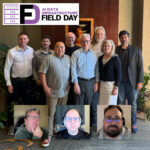|
|
 Dil Radhakrishnan, Rakshith Venkatesh, and Jonathan Symonds presented for MinIO at AI Data Infrastructure Field Day 1 |
This Presentation date is October 2, 2024 at 8:00-9:30.
Presenters: Dil Radhakrishnan, Jonathan Symonds, Rakshith Venkatesh
Why AI is All About Object Storage with MinIO
Watch on YouTube
Watch on Vimeo
Almost every major LLM is trained on an object store. Why is that? The answer lies in the unique properties of a modern object store – performance (throughput and IOPS), scale and simplicity. In this segment, MinIO details how AI scale is stressing traditional technologies and why object storage is the de facto storage standard for modern AI architectures.
Jonathan Symonds kicks off the presentation by MinIO at AI Data Infrastructure Field Day 1, describing the critical role of object storage in the realm of artificial intelligence (AI). Symonds begins by highlighting the unprecedented scale of data involved in AI, where petabytes have become the new terabytes, and the industry is rapidly approaching exabyte-scale challenges. Traditional storage technologies like NFS are struggling to keep up with this scale, leading to a shift towards object storage, which offers the necessary performance, scalability, and simplicity. Symonds emphasizes that the distributed nature of data creation, encompassing various formats such as video, audio, and log files, further necessitates the adoption of object storage to handle the massive and diverse data volumes efficiently.
Symonds also addresses the economic and operational considerations driving the adoption of object storage in AI. Enterprises are increasingly repatriating data from public clouds to private clouds to achieve better cost control and economic viability. This shift is facilitated by the cloud operating model, which includes containerization, orchestration, and APIs, making it easier to manage large-scale data infrastructures. The presentation underscores the importance of control over data, with Symonds citing industry leaders who advocate for keeping data within the organization’s control to maintain competitive advantage. This control is crucial for enterprises to maximize the value of their data and protect it from external threats.
The presentation concludes by discussing the unique features of object storage that make it ideal for AI workloads. These include the simplicity of the S3 API, fine-grained security controls, immutability, continuous data protection, and active-active replication for high availability. Symonds highlights that these features are essential for managing the performance and scale required by modern AI applications. He also notes that the simplicity of object storage scales operationally, technically, and economically, making it a robust solution for the growing demands of AI. The presentation reinforces the idea that object storage is not just a viable option but a necessary one for enterprises looking to harness the full potential of AI at scale.
Personnel: Jonathan Symonds
Why MinIO is Winning the Private Cloud AI Battle
Watch on YouTube
Watch on Vimeo
Many of the largest private cloud AI deployments run on MinIO and most of the AI ecosystem is integrated or built on MinIO, from Anyscale to Zilliz. In this segment, MinIO explains the features and capabilities that make it the leader in high-performance storage for AI. Those include customer case studies, the DataPod reference architecture and the features that AI-centric enterprises deem requirements.
MinIO has established itself as a leader in high-performance storage for AI, particularly in private cloud environments. The company’s software-defined, cloud-native object store is designed to handle exabyte-scale deployments, making it a preferred choice for large AI ecosystems. MinIO’s S3-compatible object store is highly integrated with various AI tools and platforms, from Anyscale to Zilliz, which has contributed to its widespread adoption. The company emphasizes its ease of integration, flexibility with hardware, and robust performance, which are critical for AI-centric enterprises. MinIO’s architecture allows customers to bring their own hardware, supporting a range of chipsets and networking configurations, and is optimized for NVMe drives to ensure high throughput and performance.
A notable case study highlighted in the presentation involved a customer needing to deploy a 100-petabyte cluster over a weekend. MinIO’s solution, which does not require a separate metadata database and offers a complete object store solution rather than a gateway, was able to meet the customer’s needs efficiently. The deployment showcased MinIO’s ability to scale quickly and handle large volumes of data with high performance, achieving 2.2 terabytes per second throughput in benchmarking tests. This performance was achieved using commodity off-the-shelf hardware, demonstrating MinIO’s capability to deliver enterprise-grade storage solutions without the need for specialized equipment.
MinIO also addresses operational challenges through features like erasure coding, Bitrot protection, and a Kubernetes-native operator for seamless integration with cloud-native environments. The company provides observability tools to monitor the health and performance of the storage infrastructure, ensuring data integrity and efficient resource utilization. MinIO’s reference architecture, DataPod, offers a blueprint for deploying large-scale AI data infrastructure, guiding customers on hardware selection, networking configurations, and scalability. This comprehensive approach, combined with MinIO’s strong performance and ease of use, positions it as a leading choice for enterprises looking to build robust AI data infrastructures.
Personnel: Rakshith Venkatesh
A Demonstration of the MinIO Enterprise Object Store – The AI-Centric Feature Set
Watch on YouTube
Watch on Vimeo
MinIO’s AI feature set is expansive, but there are core features that allow enterprises to operate at exascale. Those include observability, security, performance, search and manageability. In this segment, MinIO goes from bucket creation to RAG-deployment, emphasizing each core AI feature and why it matters to enterprises with data scale challenges that run from PBs to EBs and beyond.
MinIO’s presentation at the AI Data Infrastructure Field Day 1 focused on demonstrating the capabilities of their enterprise object store, particularly its AI-centric features. The core features highlighted include observability, security, performance, search, and manageability, which are essential for enterprises operating at exascale. The presentation began with an overview of the global console, which allows for the management of multiple sites across different cloud environments, both public and private. This console integrates key management systems for object-level encryption, providing granular security that is crucial for large-scale data operations.
The demonstration showcased how MinIO handles various AI and ML workloads, emphasizing the importance of data preprocessing and transformation in data lakes. The observability feature was particularly highlighted, showing how MinIO’s system can monitor and manage the health of the cluster, including drive metrics, CPU usage, and network health. This observability is crucial for maintaining performance and preemptively addressing potential issues. The presentation also covered the built-in load balancer, which ensures even distribution of workloads across nodes, and the in-memory caching system that significantly boosts performance by reducing data retrieval times.
Additionally, the presentation touched on the catalog feature, which allows for efficient searching and managing of metadata within massive namespaces. This feature is particularly useful for identifying and addressing issues such as excessive requests from buggy code. The session concluded with a discussion on the integration of MinIO with AI/ML workflows, including the use of Hugging Face for model training and the implementation of RAG (Retrieval-Augmented Generation) systems. This integration ensures that enterprises can seamlessly manage and scale their AI/ML operations, leveraging MinIO’s robust and scalable object storage solutions.
Personnel: Dil Radhakrishnan, Jonathan Symonds








